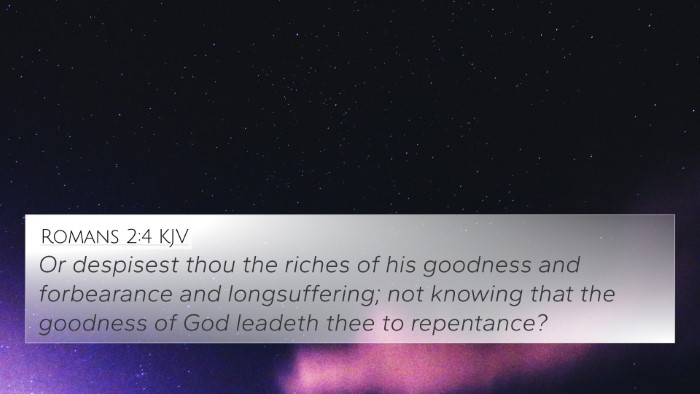Understanding 2 Samuel 12:10
Context of the Verse: 2 Samuel 12:10 is a poignant verse in the narrative of King David's profound sin concerning Bathsheba. This chapter details God's confrontation with David through the prophet Nathan, where David's transgressions are laid bare, particularly his adultery and the arranged murder of Uriah, Bathsheba's husband.
Text of the Verse: “Now therefore, the sword shall never depart from your house, because you have despised Me, and have taken the wife of Uriah the Hittite to be your wife.” (2 Samuel 12:10, NKJV)
Meaning of 2 Samuel 12:10
This verse encapsulates divine judgment in the wake of David’s sin. The sword symbolizes violence and conflict, which would plague David's lineage as a direct consequence of his actions. This signifies how personal sin can have far-reaching implications, affecting families and future generations.
Key Insights from Commentaries
- Matthew Henry: Henry emphasizes the moral lessons of this passage, pointing out that God's judgments are often carried out upon both the individual and their household. He highlights that while David was forgiven, the earthly consequences of his actions remained.
- Albert Barnes: Barnes explains the phrase “the sword shall never depart” as a profound warning of the ongoing strife and turmoil that would follow, connecting the punishment of sin to the overarching theme of divine justice. The personal judgment served as a reminder that God's mercy does not negate justice.
- Adam Clarke: Clarke discusses the historical context, attributing the turmoil in David’s life, particularly involving Absalom’s rebellion, as a fulfillment of this judgment. He underlines that this is reflective of God's method of discipline for those He loves, tying it into a broader theme of God’s sovereignty even amidst human failure.
Connections to Other Bible Verses
This verse can be cross-referenced with other scriptures to deepen understanding and clarify themes:
- 1 Chronicles 21:17: David acknowledges his sin and its responsibility for the calamity befalling Israel.
- Galatians 6:7: "Do not be deceived: God is not mocked, for whatever one sows, that will he also reap," reinforcing the principle of reaping what one sows.
- Psalm 51: David's penitential psalm post-sin, showing his acknowledgement of sin and plea for mercy.
- Proverbs 3:11-12: God's discipline as a testament of His love is reflected, emphasizing that the Lord disciplines those He loves.
- Romans 6:23: "For the wages of sin is death," which aligns with the consequences depicted in David’s story.
- 2 Samuel 13: The ensuing drama within David's family, stemming directly from his earlier sin.
- Exodus 20:5: Discusses how God's judgment for sin can impact future generations, paralleling David's situation.
- Hosea 8:7: The theme of sowing and reaping is reiterated, stating that Israel will harvest falsehood for their deeds, similar to David’s consequences.
- Matthew 1:6: References the historical lineage of David, indicating that his actions have implications that echo through generations.
- Hebrews 12:6: The reminder that God's discipline is an essential part of sonship in Him, relating it back to the parental discipline of David.
Thematic Considerations
This verse highlights several themes significant to biblical interpretation:
- The Nature of Sin: It teaches about how individual sin has far-reaching consequences.
- Divine Justice: The verse underscores God's holiness and the seriousness with which He regards sin.
- Consequences of Leadership: The responsibility of leaders for their actions and their effects on community and family.
- Hope for Redemption: While judgment is pronounced, this doesn't negate the hope of grace and forgiveness, as seen in David's eventual repentance.
- Divine Sovereignty: It emphasizes God's control over the outcomes of human sin and His ability to bring about His purposes even through human failure.
Tools for Further Study
To further explore the connections and interpretations of biblical texts, consider utilizing:
- Bible Concordances: Essential for identifying cross-references and understanding the context of specific terms.
- Bible Cross-Reference Guides: Valuable for linking scripture across both Old and New Testaments.
- Bible Study Software: Many applications facilitate the comparison of verses and themes, assisting in deeper analysis.
- Commentary Collections: Writings from various theologians provide insight and expand understanding of scripture.
- Topical Bibles: Group verses by theme for comprehensive study on specific issues or narratives.
Conclusion
The implications of 2 Samuel 12:10 serve as a somber reminder of the gravity of sin and its consequences in our lives. Through careful examination and cross-referencing with related verses, believers can gain a thorough understanding of what this passage means within the broader context of scripture. By engaging in thematic exploration and utilizing various study tools, one can reveal the richness of biblical truth surrounding sin, repentance, and divine justice.
For those seeking connections between Bible verses, this study of 2 Samuel 12:10 offers profound insights into the nature of sin, consequences, and the overarching narrative of God's redemptive work in human history.
















